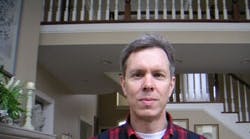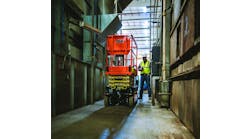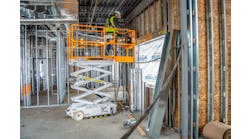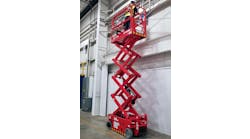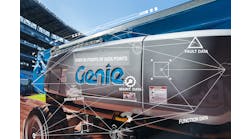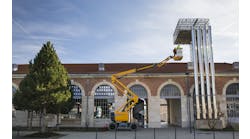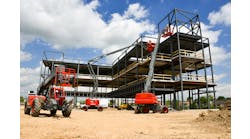Steve Shaughnessy ran his family's aerial equipment rental businesses in New England, was chief operating officer at NES, ran Ashtead's U.K. aerial business and the U.K. subsidiary of French rental giant Loxam. Now president of Skyjack, Shaughnessy sat down with RER in Orlando, Fla., to talk about his plans and ideas for the Guelph, Canada-based aerial work platform manufacturer.
RER: It's been quite an odyssey for you, from Shaughnessy Crane being acquired by NES, working for NES, A-Plant, Loxam and now Skyjack. How did your international opportunities develop?
Shaughnessy: I really liked A-Plant and Ashtead as a company. A-Plant wouldn't be on people's radar screens over here but I had contacted George Burnett the former chief executive and really one of the co-founders of the modern Ashtead in the spring of 2004. My main interest actually was that there had been a lot of disfunction at Sunbelt and they didn't have a settled senior management team at that time so I sent him my c.v. In the cover note I said that I'd lived and worked in the U.K. before and I had the right to work there so if they weren't in a position to do something at Sunbelt, I would be open to working in the U.K.
So he called a couple of days later. As it happened, he was spending a lot of time in North Carolina but we were both going to be in London at the same time a few weeks later. I lived in the U.K. much of the time from 1976 to '87 and we still had a flat in London. So I met him a couple of weeks later and maybe a month after that I got a call to say they may have an opening in their U.K. access business.
So I became director of their access business. It was not in very good shape when I arrived at a time when the market in the U.K. was booming. The fleet was old and it had all sorts of older, almost-impossible-to-get-parts-for equipment. They had some good fleet as well. I had to put a business plan together, and we basically re-fleeted the company. They did have a core group of good managers, we made some changes to the sales strategy and we invested in the business and grew it. Within about 12 to 14 months we really had turned it around and by then it was in the middle range of businesses in the U.K. in terms of its performance.
After about 18 months I was made managing director of all the specialist businesses in the U.K. And that included not just the access business but also power generation. We had a business that provided specialist equipment to rail contractors; we had a site accommodation business, site trailers and a couple of other specialty businesses. I loved it but George Burnett retired at the end of 2006. His successor was Geoff Drabble. In the spring of 2007, we had just finished a strategic review, which is not uncommon when a new CEO comes in and Geoff wanted to re-align the U.K. business with a model that was close to Sunbelt or what he believed Sunbelt's model to be. What that really meant was that over the next two years up until 2009, the specialist businesses would be eliminated as a separate entity, that we might keep one or two and grow them into big businesses, but the rest would be integrated into the general stores. So Geoff said to me that at some point in the next two years, there won't be a job for you in that current role. What he wanted me to do at that time was move to a corporate role for the group and mainly focus on M&A activity. But I preferred to be in an operational role.
That's when you moved on to Loxam?
In the middle of all this, an opportunity came to go to Loxam. I was intrigued. It was a smaller job, a step back in terms of responsibility although on paper at least the goal was that Loxam wanted to expand its activities significantly in the U.K. I'd never worked for a French company; they had a different way of doing things. It's a different culture — in my view, it was much less entrepreneurial than the way most North American companies were run. Even Ashtead is a very entrepreneurial company.
Loxam is a big company, 540 branches, 10 countries, and the core of the business is in France. The culture is very French. The business had been successful in France, in French terms at least. They have a culture that, because they succeeded with their model in France, then the same model should be implemented elsewhere. I'm not going to say whether that's right or wrong, but I guess by nature I tend more towards the entrepreneurial rather than the controlling, managerial thing. But contrary to what they would have liked to have done when I started talking to them in mid-2007, nobody could have foreseen what was going to happen in the next 12 to 15 months and regardless of what they would have liked to do and what I would have liked to do, it was really put on hold and we were in a holding pattern. I did everything I could do to take costs out of the business.
I decided last June or July that I would go. We worked out an agreement that I would stay until the end of November. I got a call from Ken McDougall of Skyjack to say Linamar had asked him to go to Mexico. So that means there would be a vacancy, it would involve a move to Canada. I said I'd like to find out more about it. I went over and had some meetings in November, went back in December, and the rest is history.
You sound as though you are quite excited about it.
I'm really excited to be at Skyjack. I had thought, a couple of times in the past, it would be interesting to be on the manufacturing side of the equation. But it's not just working for a manufacturer. It's not just the fact that it's Canada, which is a nice place, with nice people. But I've been a fan of Skyjack since I first started buying their product in 1992 with Wolf Haessler running the company. The company makes excellent products. It's a company that listens very carefully to what its customers are saying and want to see.
How do you see the market currently?
I do believe we're in the bottom of the market. I certainly hope we are. The general read I'm hearing is that the winter has been tough, January has been a particularly tough month for many people. Some of it is weather-related; we've had horrible weather in most areas in January. It's always difficult to separate whether things are really weather or whether there are other things.
Historically my view has always been that a period of bad weather only shifts the timing of when the revenue generation occurs because the work still must get done, and it can often lead to additional work as well. Look at Hurricane Katrina. Hurricane Katrina obviously disrupted everything for months, but the aftermath has been as much construction activity and as many construction-related rentals within 10 miles of the French quarter as there have been in any other city of that size in the southern United States in the last five years.
But from Skyjack's point of view, last year was horrible, absolutely horrible and I think most manufacturers would say the same thing. We did 80-percent less volume in 2008 than in 2007. We built very little, most of what we sold we sold from stock. So it was painful for the company, for the people and also for people in our own supply chain. We expect to do better in 2010.
But because we really sold out our stock, we still have some stock left, we're making equipment again. When things do break, when we really do see light at the end of the tunnel and not just a little torch, it will break quite quickly. What I mean by that is even before we begin to see normal growth patterns return, which might not be before 2012 or 2013, there will be growth. The smarter companies, the ones that really saw things happening first, haven't bought anything since late 2007. Everybody is de-fleeted, so it means that when they do begin to grow, they will need it and they're going to need to replace the stuff that they would have replaced in 2008 and 2009, so there will be a double whammy.
I think most of what will happen this year will be some fleet replacements. Last year for the most part, people bought what they absolutely had to, because they had a customer demand or a particular project that required equipment they didn't have and they didn't want to re-rent. This year some companies will be replacing fleet I hope.
Did you have any background in manufacturing?
Only as a customer. My only real connection with manufacturing — and it's only in a very limited way — when I was with NES, I was chief operating officer, we did have a couple of rebuild facilities, one in Kentucky, another in McConnellsburg, Pa., but it's not the same as new manufacturing. In another part of my career, I worked for eight years for British Telecom, it's the only time I didn't work in the equipment industry. From 1979 to 1987 I worked for British Telecom and I worked on the physical distribution side of the business. There are similarities because physical distribution, warehousing distribution and the computer support for it, is all logistics-driven and a lot of the processes and the way you go about planning for it and running it is not dissimilar to manufacturing. So in terms of the logic, I don't find it that difficult a stretch.
In fact it can be quite exciting. We're rolling out two vertical mast products this year, we have a prototype of that we call our SJ12, a vertical mast product. I was with the small group of engineers and manufacturing guys when we were trying to put the finishing touches to it. To be there as a new machine is being born is just fantastic.
I hope what I can bring to Skyjack is a pretty good feel and insight into what rental customers expect from a manufacturer. And I hope that that will make us be a little bit more responsive. And one of the challenges that we face, other than where we are in terms of our business performance generally, we have holes that we have to fill in our product line.
It sounds as though listening to customer needs is an important value for a manufacturer?
I remember, probably 15, 16 years ago, when a company that is one of our competitors today was coming up with a new model. This particular manufacturer did spend a lot of time with its top 10 customers talking to people like me and our service people about what we wanted to see in this particular machine and what didn't we want to see. And after they put these ideas together, they did some pretty extensive field testing. That machine was pretty damn close to most of the things that we were telling them we wanted to see. But what really shocked me was when they came to do the next machine, the machine after that, they didn't do any of that. It seemed like they got into a process where everything was driven by the R&D teams and the quality teams and a lot of it was driven by trying to drive out manufacturing costs.
But I haven't forgotten that lesson and one of the things I want to make certain of is that as we fill in the holes in our product line, that we make sure that we ask our customers what it is they want to see from us. They are buying equipment from our competitors that we don't make today. And the simplest question of all, and I used to ask similar things to rental customers, is “What are our competitors providing you today that if we were able to offer it you would prefer to buy from us?” It really is as simple as that and that's one of the things that I want to make sure that we do over the next couple of years.
The other thing I want to try to do is to look at ways that we can compress our R&D timetable. Because R&D is an expensive process, it costs a lot of money to develop a new machine. We follow very strict quality and development processes in the company, a lot of which we learned and we're continuing to evolve from the way that Linamar does things. Being in the automotive sector gives us a leg up on some of our competitors that don't have that experience.
How does the relationship with the automobile industry help?
Linamar is a very lean and nimble company, there's not a huge heavy hierarchy in the business and Linamar has done a good job of learning and implementing lean manufacturing techniques and a quality operating system that are similar to that which the best American automakers use. We will continue to adapt and improve our use of those tools and techniques and I believe that as we get to the point where people are re-fleeting and growing at the same time, it's going to put us in a much better position than some of our competitors at re-assembling our old supply chain and ensuring that we're going to be in a place to meet the demand.
Maybe one of the things that attracted Linamar to you was your knowledge of the rental customer point of view?
I think so. They clearly weren't attracted to me for my manufacturing experience. On the other hand, when I hired rental sales people, I have often hired people that never rented a piece of equipment in their life and the reason for it is you got smart motivated men and women, you are in a better position to mold them the way that you want. Linamar does have a particular way of manufacturing. Linamar has a quality system; we have a global operating system for the company. I'm not coming to the company with any pre-conceived ideas about the way to manufacture something.
But on the other hand, I do have an idea of what customers expect from a manufacturer. The other thing that I have to offer, I could be wrong about this, but I don't think there is anybody else in the aerial industry, particularly in the rental side that has operated at the senior level that I have in both North America and Europe. So I have an understanding of the company's two key markets today. I expect that was probably another advantage in their eyes.
Skyjack however is gearing up for international growth, is it not?
We are expanding. We got our business license to operate in China so we have a business plan for our sales and service operation in China. It will initially be based in Wuxi where Linamar has manufacturing facilities. And that's part of our company strategy where possible when we open up a new facility of any kind, we like to co-locate with other company facilities.
We have people on the ground there now anyway, but we will be bringing product into China fairly soon and we will have people there to support it. We expect to also be in South America and Australia before the year is over. But even after we're established there, the fact is that our core market for a couple of years will continue to be North America and Europe.
What do you think are the strengths and weaknesses of Skyjack in terms of distribution, and of products?
The strengths are the quality of the products that we build today. We build machines that we believe, and I know some of the products have been compared for this versus our competitors, we believe we make products with the lowest total life cost generally available in the market today. We believe that's why people buy from us. If you were going to go and do a survey of 100 aerial lift mechanics in the United States and ask them which machines they find are the easiest to service and maintain, I'll be shocked if Skyjack doesn't place very highly in that survey because I know from mechanics that have worked for me in the past, that the general perception, you go work on a Skyjack, they all work the same way. You work on one Skyjack, you understand basically how the other ones would work.
Southwest Airlines is so successful for the same reason. Any Southwest Airlines pilot can step into any plane and they can fly it whether or not they've ever been in it before. Because every single plane they have in their fleet, they buy Boeing 737s, unless it's changed in the last couple of years, but that was their business model. They might be different series, but they all look alike, and they fly the same way.
So first it's products. Second is the company culture. We do describe ourselves as a company that cares. Some people might think it's cheesy but we do care about the customers and I believe that our customers appreciate that. I also believe that we have excellent customers. People that buy from us buy because they get it. They understand what Skyjack is about and they understand what they're getting from us.
If we have weaknesses at the moment, I think really the only big weakness is that as a company that is striving to be one of the top three aerial manufacturers in the world, we do have holes, particularly in our boom line. We don't have an articulated boom in the 60-foot range and we don't have any booms in the 80-foot range and above. It may not be a big part of the overall unit sales but the fact that we don't have it has probably prevented us from becoming some customers' or prospective customers' No. 1 or No. 2 supplier of choice. We do know that some people that have got dual supply chains that we probably have been excluded from being their No. 1 or 2. Nevertheless in spite of their policies, a lot of those people will still come to us and buy our scissors and some of our boom models and now our telehandlers because they really like the product quality.
Are you trying to fill those holes?
We are. We have a plan both for new products and for re-design of some of our existing ones that takes us right up to 2016 and 2017. And when we renew the plan next year, we'll probably extend that. We will probably always have a rolling 6- to 7-year development plan. But one of the things that I want to try to do is to see what we can do to compress the timeline on certain critical models.
Were there any surprises or unexpected first impressions when you started at Skyjack?
I would say nothing negative. The only surprises really have been pretty pleasant ones. I've known some of the people in the company since I first started dealing with them. I've known Dave Stewart since 1992 and there are a couple of other people at the company I've known almost as long. On the positive side my reception has been very good at the company. The other thing I've been pleasantly surprised about is that in spite of the difficulties the employees that remain with the company have gone through, that morale is very high and people are very positive about Skyjack. They like working for Skyjack, they like being part of Linamar and I guess the only other thing I would add to that is as I learn more about Linamar and its capabilities, maybe that has been the biggest and best surprise of all because I realize that it's kind of the ace up my sleeve. It puts me in a much better position than I might have realized two or three months ago to really do the things with Skyjack that we want to. Skyjack was one of the better performing companies in the group for a number of years, which is hardly surprising given how strong the equipment manufacturing business was in the middle part of this decade.
Those are all the good things. I can honestly say there hasn't been a negative thing. I never worked in Canada before, I visited Canada sometimes for business and to go skiing, but I hardly come across anybody whether it's going in to get my Canadian SI number and dealing with the official bureaucracy to going and getting a bank account set up, everybody that I encounter, whether they are co-workers or people in officialdom or immigration, there is something to be said about the culture in Canada that's very positive. So I am looking forward to living there.
